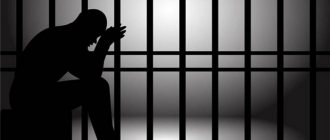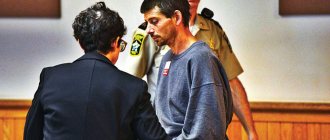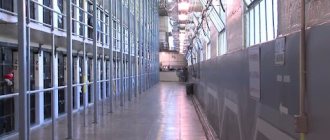New edition of Art. 91 Code of Criminal Procedure of the Russian Federation
1. The body of inquiry, the inquirer, the investigator has the right to detain a person on suspicion of committing a crime for which a sentence of imprisonment may be imposed, if there is one of the following grounds:
1) when this person is caught committing a crime or immediately after its commission;
2) when victims or eyewitnesses point to this person as having committed a crime;
3) when obvious traces of a crime are found on this person or his clothing, on him or in his home.
2. If there is other data giving grounds to suspect a person of committing a crime, he may be detained if this person tried to escape, or does not have a permanent place of residence, or his identity has not been established, or if the investigator, with the consent of the head of the investigative body, or the interrogating officer with With the consent of the prosecutor, a petition was sent to the court to select a preventive measure in the form of detention in relation to the specified person.
Grounds for restriction of freedom in accordance with Art. 91 Code of Criminal Procedure of the Russian Federation
An investigator/inquiry officer may detain a citizen suspected of an unlawful act for which imprisonment is provided when:
- This subject is caught while directly performing the action or immediately after it.
- Eyewitnesses/victims will point to this citizen as being involved in the act.
- Traces were found on his face, clothes, on his person, in his home, clearly indicating that this person had committed an assault.
One of the above circumstances is sufficient for detention.
Features of the bases
The norm in question provides for 4 circumstances in the presence of which the subject may be detained. According to paragraph 1 of the article, it is permissible to capture a citizen when suppressing a criminal act. Actual detention is also carried out in the event of an attempt and preparation for a crime. This procedural action is performed at the scene of the incident or during the pursuit of the attacker immediately after the act. Actual detention can be carried out by any person. This may be not only an employee of the investigative/inquiry agencies, but also other law enforcement agencies, as well as eyewitnesses, the victim. The employees who carried out the arrest are subject to recusal if the action was taken before the initiation of proceedings and there were no other eyewitnesses to the incident. In this case, the investigator/interrogator acquires the status of witnesses.
Art. 91 Code of Criminal Procedure of the Russian Federation with comments
Restriction of the freedom of a citizen suspected of involvement in an attack is one of the procedural coercive measures. It is mentioned in Article 5 of the Code. According to paragraph 11 of this norm, the period of detention under Art. 91 of the Code of Criminal Procedure of the Russian Federation – no more than 48 hours. The specified period begins from the moment of actual forced restriction of the subject’s freedom.
It should be noted that the possibility of limiting the rights to personal integrity and freedom is provided for by the Constitution. As established in Part 2 of Article 22 of the Basic Law, imprisonment and detention are permitted only by court order. Before its adoption, a person’s freedom may be limited when applying Art. 91 of the Code of Criminal Procedure of the Russian Federation for a period of no more than 2 days.
The Constitution, while providing for the possibility of applying a preventive measure to a subject, linking it with the need to protect the constitutional system, the state, the population, the health of other citizens, their interests and rights, does not establish specific grounds, procedure and conditions under which detention is allowed, referring this issue to its competence federal legislator.
Eyewitness impressions
There are several military units in the village of Roshchinsky, so there is a military hospital, a post office, shops and several ATMs. Soldiers of military unit 59292 live in a regular barracks. There is a washing machine and a shower for the entire unit. The heating has recently been repaired. For contract soldiers, there is a cockpit dormitory with rooms for two people and showers. Family officers live in a block dormitory or receive official housing. The canteen is located on the territory of the unit, the food is good, and catering is handled by civilian staff. There is also a library, which contains books, military magazines and periodicals.
Disposition of brigade soldiers
Almost all eyewitnesses note poor water in the Samara region, including in Roshchinsky. Coolers are installed in the barracks and training buildings, and soldiers carry boiled water in flasks. Drinking water in the store is quite expensive.
Before taking the oath in a unit such as military unit 59292, a course is held for young fighters. It lasts about a month. During this time, conscripts become familiar with the peculiarities of military service, the daily routine, and study the regulations. Typically, during the KMB, a quiet hour is practiced - sleep after lunch, from 14.30 to 15.30. There is no quiet time during the rest of the service period.
Parade ground of the 91st brigade
The oath is taken at different times: at 10.00, at 12.00 or at 14.00, because there are many other units in the Roshchinsky garrison. The event date may be rescheduled. The fighter will provide the exact information - before the oath, telephone numbers are provided for contacting relatives. Also, a photographer works during the oath, and then parents receive a payment receipt and a list of photos by mail. After the oath, dismissal is allowed on the security of the passport of the parents or wife. Dismissal lasts until 6.50 the next morning. Throughout the entire period of service, leave is granted according to the same principle, from Saturday to Sunday.
The fighter must notify the unit commander about the arrival of relatives in the form of a report (written on Thursday). Sometimes there are New Year's layoffs - they last about two days. However, soldiers are not allowed outside the village.
Military hospital in the village. Roshchinsky
During the military camp, soldiers maintain contact with relatives only on Sundays - mobile phones are issued for an hour before lights out. The rest of the time they are kept by the unit commander and are issued on Saturday after 14.00 and on Sunday for the whole day. It is recommended to send an inexpensive phone, a spare battery or a tee, because... There are few sockets in the barracks of military unit 59292. For communication, it is recommended to purchase Megafon SIM cards with tariffs for the Samara region. If a fighter has an MTS SIM card, it is worth connecting, but only for the first time, because... this connection in Roshchinsky does not work well. Eyewitnesses do not recommend calling the soldier yourself, but waiting until he gets in touch.
The allowance is paid to a VTB-24 card, but in the military town there are several ATMs of Sberbank of Russia. You can open a Momentum card in your name and give it to a military personnel. They also send money using Fast and Furious postal orders. Cash is withdrawn by soldiers accompanied by an officer or contract soldier. In the same way they make purchases at the local chip shop.
Pedestal on the territory of the military unit
Field exercises are held at a training ground thirty kilometers from the village, near the village of Dubovy Umet. First, individual units leave, and then the entire personnel of military unit 59292. Food and water are brought to the training ground. Long-term exercises are held in the summer, the fighters live in tents and organize a field kitchen. Sometimes there are business trips outside the district, in particular to the Kapustin Yar training ground. There is a medical unit on the territory of the unit, but medical care is provided only to soldiers who do not require hospital treatment. The final diagnosis is made by a doctor who arrives from the 354th military hospital. If a soldier feels unwell, he can contact the head of the medical unit. You can visit military personnel in the hospital every day, from 17.00 to 19.00 on weekdays and from 11.00 to 13.00 on weekends. Visits are allowed both inside the department and outside. Access to the hospital is carried out using passports; it is also worth taking shoe covers with you.
At the checkpoint of the military unit
Nuances
The rules of the Code of Criminal Procedure establishing the rules of detention do not introduce any restrictions that go beyond the scope of the Constitution. On the contrary, according to experts, the articles of the code significantly narrow the possibility of their application.
The moment of actual forced restriction of a subject’s freedom is considered to be the moment of deprivation of his ability to move freely. Detention may be accompanied by the use of special means and a personal announcement to the person about the implementation of the preventive measure.
Suspect
This is the subject:
- In respect of whom criminal proceedings have been initiated according to the rules and grounds established by Chapter 20 of the Code.
- Detained in accordance with Art. 91, 92 of the Code of Criminal Procedure of the Russian Federation.
- In respect of whom a procedural measure of restraint has been applied prior to official presentation in accordance with Article 100 of the Code.
- Notified of suspicion of his involvement in the act.
This list is contained in norm 46 of the code and is considered exhaustive.
Information for mom
Parcels and letters
Unit address: 443539, Samara region, Volzhsky district, town. Roshchinsky, military unit 59292, full name of the soldier, unit letter. Post office address: 443539, Samara region, Volzhsky district, town. Roshchinsky, on demand. The parcel can also be sent to the address of the unit. Soldiers with a military ID pick up parcels and go to the post office in groups, accompanied by officers.
Contact phone numbers
8 – brigade switchboard; 8 – head of the 354th military hospital (reception); 8 – head of the medical unit; 8 – post office phone number.
Information stand “Combat path of the unit”
Special cases
Special rules are provided for persons with parliamentary immunity. They are mentioned in Article 449 of the Code. These include:
- Members of the Federation Council.
- State Duma deputies.
- Judges of the federal and magistrate courts.
- Prosecutor.
- Chairman, his deputy, auditors of the Accounts Chamber.
- Former President of the Russian Federation.
- Commissioner for Human Rights.
If they are detained on the basis of the provisions of Art. 91 of the Code of Criminal Procedure of the Russian Federation, they must be immediately released after identification.
If a preventive measure was applied to an assistant of a member of the Federation Council or a State Duma deputy, the relevant parliamentarian is informed about this immediately. The corresponding regulation is contained in Article 37 of Federal Law No. 3.
Purpose of the measure
Detention under Articles 91 and 92 of the Code is permitted only in open criminal proceedings. It is aimed at clarifying the subject’s involvement in the act and resolving the issue of placing him in custody.
The law prohibits the use of the provisions of Art. 91 of the Code of Criminal Procedure of the Russian Federation to obtain a confession of a crime from a person. No one is obliged to confirm their non-involvement in the attack. The burden of proof, as well as refutation of the arguments presented in defense of a person, rests with the prosecution.
Limits of application of measures
Taking into account the presumption of innocence, the detention of the subject according to the rules of Art. 91 of the Code of Criminal Procedure of the Russian Federation, taking him into custody in the future should be a last resort, not the rule, but rather the exception to it. In this case, deprivation of liberty should be considered as a sanction to be imposed last. Such punishment is permissible to apply if another measure, in accordance with the nature and severity of the act, is clearly insufficient.
Restrictions that are imposed on citizens detained on suspicion of involvement in crimes must be consistent with the purpose for which they were applied and be the minimum necessary.
Story
The formation traces its history back to the 191st Signal Regiment, formed in June 1942. He became part of the 3rd Guards Army and took part in operations to cross the Dnieper, liberate Prague and capture several German cities. For military services during the liberation of Kielce he received the name Kielecki. He received the Order of the Red Star and the Order of Alexander Nevsky for the successful completion of combat missions near Berlin. At the end of the Great Patriotic War, he was relocated to Kuibyshevo (now Samara). After military reform, it was reorganized into the 91st control brigade (2009). The formation, together with other military units of the Roshchinsky garrison, took part in various operations in the territory of Abkhazia, Chechnya, Tajikistan, Kosovo and South Ossetia.
Sleeve emblem of the 91st Brigade
Report a crime
It must be taken into account that the primary source of information about the act reported by the citizen who committed it is a statement written by him in his own hand or recorded in the protocol of confession. In judicial proceedings, this document is recognized as independent evidence.
Within the meaning of the legislation, as well as the explanations of the Plenum of the Supreme Court, enshrined in Resolution No. 2 of 2007, a person’s report of an assault made by him after his arrest does not exclude the recognition of this statement in the future as a mitigating circumstance.
Important point
If law enforcement agencies had information about the crime (procedural documents, reports of victims, witnesses, etc.), and the detained subject, in turn, knew about it, his confirmation of the fact of involvement in the act cannot be considered as a confession. It is recognized as another mitigating circumstance.
Your visit
How to get there
- From the train station, take minibus No. 14, 22, 40, 52 or 60. From the bus station, take minibus No. 39, 46 or 22. Get to the Aurora bus station.
- From Aurora to Roshchinsky there are minibuses No. 139-a and 139.
- You can also hitch a ride; they are located at an intersection not far from the bus station.
- Some eyewitnesses suggest using the services of Samara taxis (“Leader”), (“Bravo”).
Minibuses stop near a food stall. The locals will tell you how to get to the checkpoint. Taxi drivers and fellow travelers bring you directly to the checkpoint.










